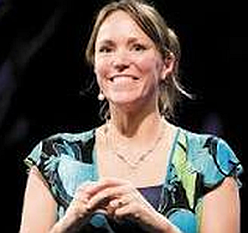Our personal destiny may already be hard-wired into our brain, British neuroscientist asserts Every now and then someone somewhere comes up with an audacious, mind-blowing contrarian insight against most everything that a reasonably intelligent and educated mind holds about us humans and our individual destinies.
That someone is 39-year-old Cambridge neuroscientist Hannah Critchlow, who persuasively asserts that we humans are actually not authors and masters of our own destinies but "merely machines made flesh: operating under the necessary illusion of free will, while our subconscious circuitry is busy driving us down paths preordained by our genes."
Dr. Hannah Critchlow wires up Dr. Rowan Williams, former Archbishop
of Canterbury, to a brainwave reader at last year’s Hay Festival
in the United Kingdom (THE TELEGRAPH.UK PHOTO)
In a feature article in the May 8, 2019 issue of
Premium.Telegraph.co.uk, Rachel Cocker writes of Critchlow: "She is of the steadily burgeoning counterview: that a complex dance between our genetic inheritance and experience means much of how our life unfolds is out of our conscious control. Our early years’ environment shapes us, too, of course, but science is uncovering a hereditary basis, she says, not just for our health, but our wealth – and even the age at which we lose our virginity."
Critchlow, a bubbly mother of three who wanted to be a medical doctor but went on to get a first-class biology degree and a PhD in neuropsychiatry instead, recently came up with a book,
The Science of Fate (Hodder & Stoughton, 2019, 256 pages) that purports to show that everything from what we eat, to who we marry and how we vote, may already be hard-wired into our brains.
Of her worldview about fate, Critchlow has this to say: "Learning how little mastery we may have over our own minds doesn’t detract from the way that we’re special as humans. It actually, to me, makes it more beautiful, and more mesmerizing – and it makes me accept other people a little bit more.”
Read Rachel Cocker's "Is our fate decided the moment we're born? Why free will may be a (necessary) myth" in the May 8, 2019 issue of Premium.Telegraph.co.uk now! THIS WEBPAGE IS NOW COVERED BY A PAYWALLRead neuroscientist Dr. Hannah Critchlow's interview in The Guardian.com where she asserts “Changing the way that you think is cognitively costly”ABOUT THE AUTHOR:
Dr Hannah Critchlow is the Science Outreach Fellow at Magdalene College, University of Cambridge, and has been named a Top 100 UK Scientist by the Science Council for her work in science communication. She is listed as one of the University of Cambridge's "inspirational and successful women in science" and appears regularly on TV, radio and at festivals to discuss and explore the brain.
Check out this 2011 reading in the Forum disputing free will, "Research shows responsibility resides in how people interact, not in the brain."